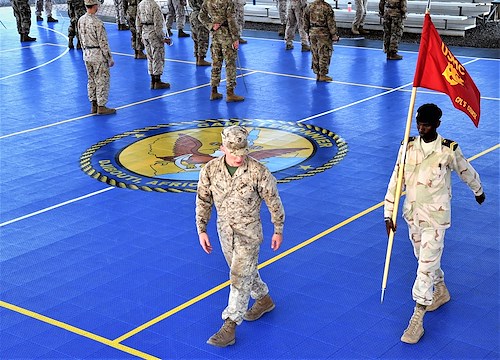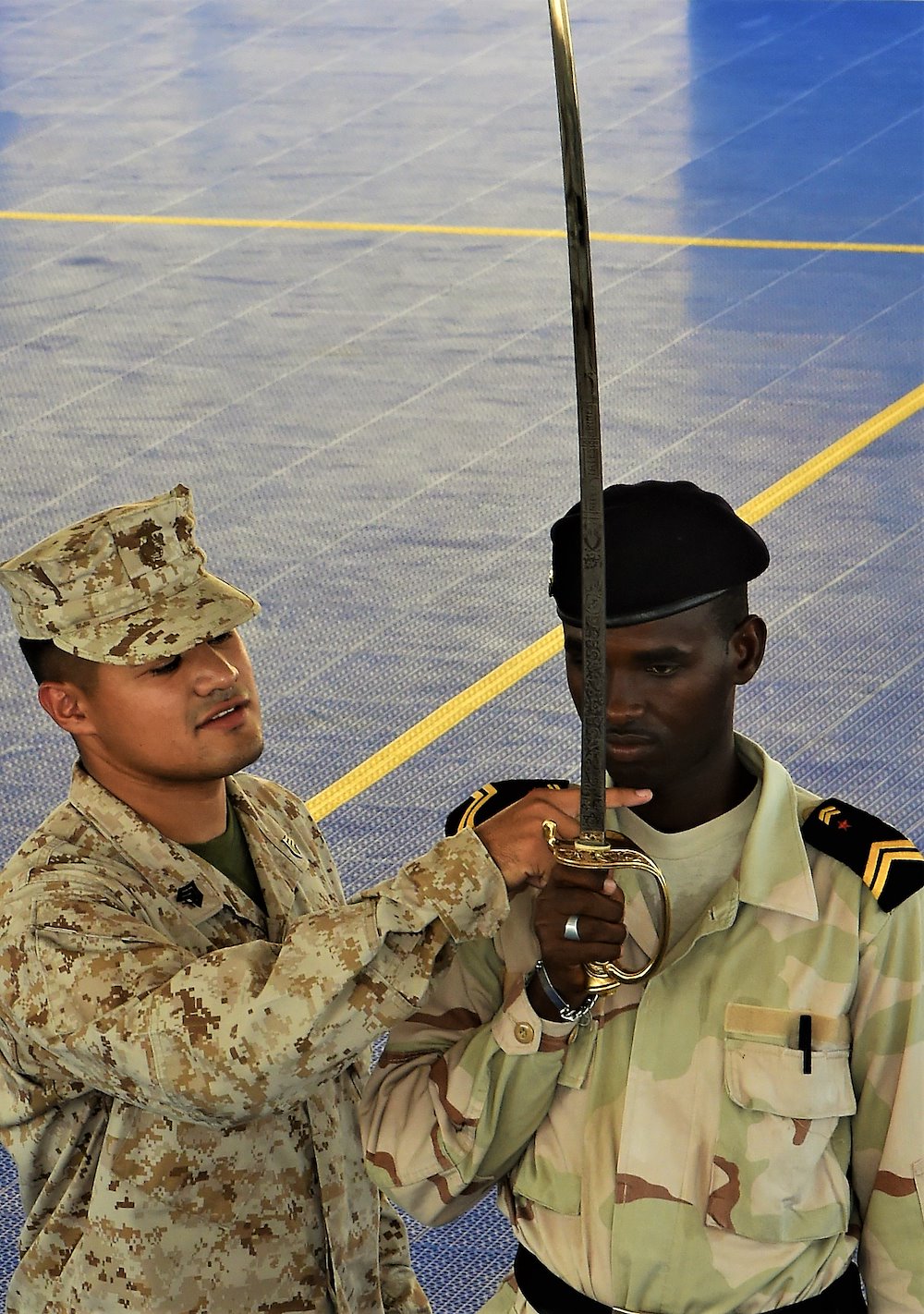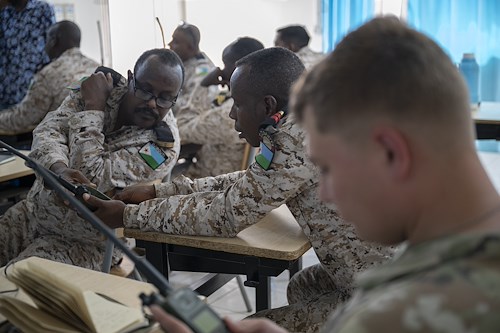Gallery contains 5 images
×
Photo 1 of 5
U.S. Marines strengthen Djiboutian Army by leading joint bilateral academy course in Africa
U.S. Marine Cpl. Payton Martin of the 15th Marine Expeditionary Unit helps Abdo-Salam Yacin, a Djibouti Armed Forces (FAD) soldier, observe the use of the guidon during the U.S. Marine Corps Corporals Course held by Combined Joint Task Force - Horn of Africa at Camp Lemonnier, Djibouti, Oct. 7, 2017. FAD participation in the CJTF-HOA Joint Corporals Course denotes the important occasion of an African military taking part in this curriculum. (U.S. Air National Guard photo by Tech. Sgt. Andria Allmond)
Photo by: U.S. Air National Guard Tech. Sgt. Andria Allmond
Photo 2 of 5
U.S. Marines strengthen Djiboutian Army by leading joint bilateral academy course in Africa
Abdo-Salam Yacin, a Djibouti Armed Forces (FAD) soldier, observes the use of tactical communication radios as instructed by U.S. Army Spc. Christinejoy Cantor, Combined Joint Task Force-Horn of Africa (CJTF-HOA) tactical communications, during the U.S. Marine Corps Corporals Course held CJTF-HOA at Camp Lemonnier, Djibouti, Oct. 4, 2017. The course lasts from Oct. 2 – 19 and included partner-nation members. (U.S. Air National Guard photo by Tech. Sgt. Andria Allmond)
Photo by: U.S. Air National Guard Tech. Sgt. Andria Allmond
Photo 3 of 5
U.S. Marines strengthen Djiboutian Army by leading joint bilateral academy course in Africa
Abdo-Salam Yacin, a Djibouti Armed Forces (FAD) soldier, observes the use of the guidon during the U.S. Marine Corps Corporals Course held by Combined Joint Task Force - Horn of Africa (CJTF-HOA) at Camp Lemonnier, Djibouti, Oct. 7, 2017. Two FAD soldiers represent African partner-nation members taking part in the Combined Joint Task Force-Horn of Africa Joint Corporals Course. (U.S. Air National Guard photo by Tech. Sgt. Andria Allmond)
Photo by: U.S. Air National Guard Tech. Sgt. Andria Allmond
Photo 4 of 5
U.S. Marines strengthen Djiboutian Army by leading joint bilateral academy course in Africa
U.S. Marine Sgt. Raymundo Rodriguez, Combined Joint Task Force - Horn of Africa (CJTF-HOA) budget chief and faculty advisor for the CJTF-HOA Joint Corporals Course, assists in advising Abdo-Salam Yacin, a Djibouti Armed Forces (FAD) soldier, during sword instruction held at Camp Lemonnier, Djibouti, Oct. 7, 2017. The skillsets provided through the course can help CJTF-HOA in supporting Djibouti by reinforcing abilities that can be used in combating transnational threats, executing effective peace operations, responding to crisis and promoting regional stability. (U.S. Air National Guard photo by Tech. Sgt. Andria Allmond)
Photo by: U.S. Air National Guard Tech. Sgt. Andria Allmond
Photo 5 of 5
U.S. Marines strengthen Djiboutian Army by leading joint bilateral academy course in Africa
Two Djibouti Armed Forces (FAD) soldiers, Maoulid Daher Cheick and Abdo-Salam Yacin, observe during a lecture for the U.S. Marine Corps Corporals Course held at Camp Lemonnier, Djibouti, Oct. 4, 2017. The Combined Task Force – Horn of Africa hosts a joint corporals course for the military branches here, but this iteration also included partner military members. (U.S. Air National Guard photo by Tech. Sgt. Andria Allmond)
Photo by: U.S. Air National Guard Tech. Sgt. Andria Allmond
CAMP LEMONNIER, Djibouti -- The U.S. Marine Corps is arguably one of the most revered institutions within the U.S. Department of Defense. So, when Combined Task Force – Horn of Africa (CJTF-HOA) leadership here recently welcomed members of the Djibouti Armed Forces (FAD) into the U.S. Marine Corps Corporals Course, it was a distinct honor.
Stretching from Oct. 2 – 19, this marks the first time Marines of CJTF-HOA and 15th Marine Expeditionary Unit have joined to instruct the U.S. Marine Corps Corporals Course to partner-nation members.
“This course is imperative in developing successful small-unit leaders by utilizing realistic problem-based situations that a Marine corporal will come across once they return to their commands,” said U.S. Marine Corps Master Sgt. Scott Hart, the course director and CJTF-HOA J3 senior enlisted leader. “The program at Camp Lemonnier is run in a joint-branch environment, which we fully incorporate throughout the course.”
The Joint Corporal’s Course here has grown to include all military branches that serve on the installation. Faculty advisors are sourced from each branch, following the U.S. Marine Corps’ course curriculum, while including education and tradition from alternate services. The goal is to create well-rounded junior enlisted members who are able to lead in the joint environment.
“When our Marines, Soldier, Sailors, Airmen, and now partner nation members graduate this course, we are telling them that they are on the path to being leaders from the front – by applying our core values of honor, courage and commitment.”
The corporal’s course distance-education program provides students with the basic knowledge and skills necessary to become successful small-unit leaders using realistic problem-based situations that a Marine corporal will encounter. More importantly, it provides the training and leadership skills that will benefit commanders and the Marines who they will lead and mentor upon graduation. Specifically at CJTF-HOA, the course provides that same training and leadership skills to Marines, Sailors, Soldiers, and Airmen, which will greatly enhance the directorates and junior enlisted aboard both the CJTF-HOA staff and the Camp Lemonnier.
Finishing this course is a requirement for Marine corporals in order to be eligible for promotion to sergeant. This skillset, when presented to FAD members, assists CJTF-HOA in supporting Djibouti by reinforcing abilities that can be used in combating transnational threats, executing effective peace operations, responding to crisis and promoting regional stability.
“This is how we work with the U.S. forces here – together, as a team,” said Abdo-Salam Yacin, a FAD sergeant in the class. “This group is very welcoming and there is a mutual respect.”
Not only does FAD inclusion in the course bolster operational objectives, it also confirms U.S. Africa Command’s interest in supporting military-to-military relationships. Networking between nations can serve to provide the platform for a stable East Africa.
“With any kind of academy that we do in the Marine Corps, the big takeaway – in my experience – has been trading best practices,” said U.S. Marine Corps Staff Sgt. Steven Andrews, program staff noncommissioned officer in charge. “The FAD will get a firsthand look in how we develop our future leaders, and how we think. In turn, the U.S. students get the opportunity to work directly with their host-nation military and see diversity in each system.”
Andrews said that the U.S. Marine Corps executes a system of decentralized leadership – the act of delegating leadership roles down to the smallest unit level – and this idea is being shared with the Djiboutian soldiers.
Many elements of military professionalism discussed at the course crossed international lines.
“Discipline and respect,” said Abdo-Salam. “We found here that our traditions were the same. I would recommend to any other [FAD soldiers] attending this course to keep with those traditions and maintain discipline and respect, because that is what is conveyed here.”
CJTF-HOA has a history of sharing best practices with the FAD. For example, earlier this month members of the tactical communication staff here met with their Djiboutian counterparts for a three-day exchange. Prior to that, Airmen from the CJTF-HOA Public Affairs Office spent the day with four FAD members to share techniques of messaging through imagery using both still and video cameras.



















